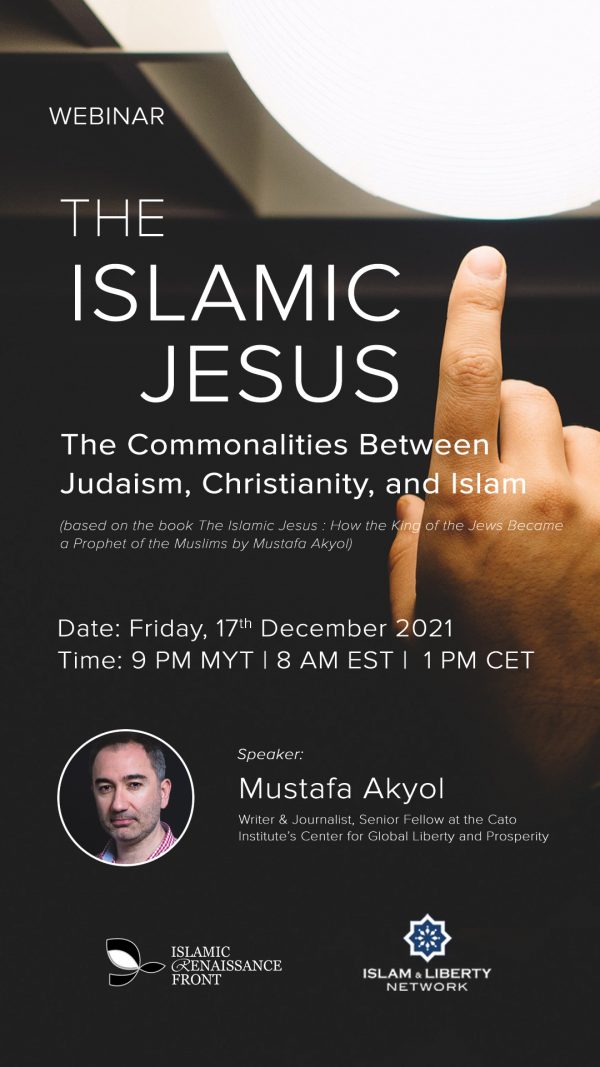Date: Friday, 17th December 2021
Time: 9 PM MYT || 8 AM EST || 1 PM CET
Speaker:
Mustafa Akyol, Writer & Journalist, Senior Fellow at the Cato Institute’s Center for Global Liberty and Prosperity
Moderator:
Osman Softić, Senior Research Fellow, Islamic Renaissance Front
Jointly organised by:
Islamic Renaissance Front (IRF) & Islam and Liberty Network (ILN)
The Zoom link will be sent upon registration before 16th December 2021.
You are welcome to join the chat during the webinar. You can also send your questions in advance to [email protected]
History has narrated the story of a great man called Jesus. He was born to a virgin mother (the only woman the Qur’an mentions by name) and lived an honourable life. But it was his death that has proven to be an influential event that has shaped the full course of history since its beginning, and perhaps till the end of time.
To the Jews, Jesus was a revolutionary zealot who was supposed to be the King and the Messiah. He fought against the corrupt practices of the religious establishment and the cruel occupation by the Romans. His messianic mission came short, as he was killed on the cross for the crime of sedition against the mighty Roman Empire.
To the Christians, the execution of Jesus is not the end; in fact, the crucifixion signifies a new beginning. Jesus died for all human beings as a sacrifice for all of our sins, and by believing in his divine status, men are on the right path to attaining salvation.
To the Muslims, Jesus is known as ‘Isa ‘alaihissalam. He was a man, turned into a Prophet, a messenger of God, particularly to the Children of Israel. He conforms to the teachings of the earlier Prophets and Holy Books, was awarded with the holy book, Injil, to guide the Children of Israel so they may obey the rule of God, and follow the right path of living.
Despite the differences of historical narratives and religious doctrines regarding this important figure, Jesus at best signifies the key values in living life in this world: justice, hope and love. These values are even more important in current times for the survival of humanity.
Reflecting on this important figure, this webinar on The Islamic Jesus: The Commonalities Between Judaism, Christianity, and Islam shall serve, once again, as a platform to discuss the topic further, in good faith, for the benefit of each of us, regardless of our religious differences.
About the Speaker
 Mustafa Akyol is a senior fellow at the Cato Institute’s Center for Global Liberty and Prosperity, where he focuses on the intersection of public policy, Islam and modernity. Since 2013, he has also been a contributing opinion writer for the New York Times, covering politics and religion in the Muslim world. He is the author of Reopening Muslim Minds: A Return to Reason, Freedom, and Tolerance (2021), The Islamic Jesus: How the King of the Jews Became a Prophet of the Muslims (2017), and Islam without Extremes: A Muslim Case for Liberty (2011). The book Islam Without Extremes and its the Malay translation Islam Tanpa Keekstreman were banned by the Ministry of Internal Affairs of Malaysia, only to be unbanned later after a court challenge at the Court of Appeal. Akyol has a bachelor’s degree in political science and a master’s degree in Ottoman history from the Boğaziçi University in Istanbul, Turkey. Throughout the past decade he has given regular lectures at the Nato Defense College and Acton University, in addition to many talks on campuses and public venues in the United States and around the world. In 2017, he was also a senior visiting fellow at the Freedom Project at Wellesley College.
Mustafa Akyol is a senior fellow at the Cato Institute’s Center for Global Liberty and Prosperity, where he focuses on the intersection of public policy, Islam and modernity. Since 2013, he has also been a contributing opinion writer for the New York Times, covering politics and religion in the Muslim world. He is the author of Reopening Muslim Minds: A Return to Reason, Freedom, and Tolerance (2021), The Islamic Jesus: How the King of the Jews Became a Prophet of the Muslims (2017), and Islam without Extremes: A Muslim Case for Liberty (2011). The book Islam Without Extremes and its the Malay translation Islam Tanpa Keekstreman were banned by the Ministry of Internal Affairs of Malaysia, only to be unbanned later after a court challenge at the Court of Appeal. Akyol has a bachelor’s degree in political science and a master’s degree in Ottoman history from the Boğaziçi University in Istanbul, Turkey. Throughout the past decade he has given regular lectures at the Nato Defense College and Acton University, in addition to many talks on campuses and public venues in the United States and around the world. In 2017, he was also a senior visiting fellow at the Freedom Project at Wellesley College.
Program:
900-905PM: Introduction by the Moderator, Osman Softić, Senior Research Fellow,Islamic Renaissance Front
905-945PM: Presentation by Mustafa Akyol
945-1020PM: Discussion
1020-1030PM: Concluding remarks by the Dr. Mohsin Naqvi, ILN Fellow & scholar in Biblical studies from NC State University, Chapel Hill


